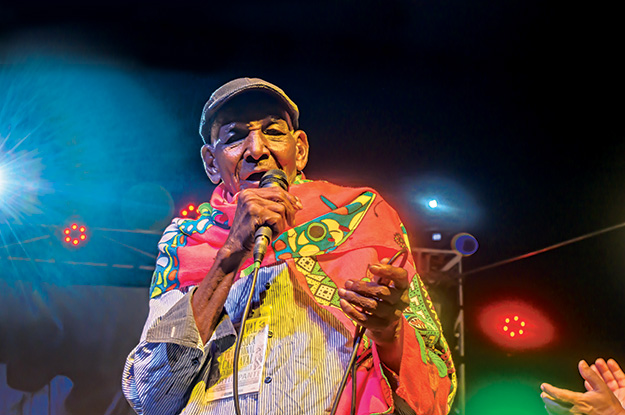This article is adapted from AQ’s print issue on peace and economic opportunity in Colombia. This article has been updated.
Magín Díaz isn’t a name most Colombians are familiar with, but his influence in the country’s lush Caribbean coast is everywhere — in the rhythms of its dance clubs, the sounds of carnival, and the songs of workers laboring in the cane fields.
“Music is my life,” said Díaz. “It’s how I fly.”
Illiterate, poor, and of African descent, Díaz spent decades composing traditional Colombian ballads in near total obscurity — unknowingly signing away the rights to profit from his work or watching as credit for his songs was assigned to others.
But now, at 96, Díaz is finally getting the credit he deserves — and living what may be the most exhilarating moment of his musical career, thanks to the recent release of his debut solo album, El Orisha de la Rosa.
This moment began in 2015, when a group of musicians and visual artists led by Daniel Bustos and Colombian collective NONAME started a crowdfunding campaign to shine a light on Díaz’s enormous contribution to popular Colombian music. Though he had recently recorded his music elsewhere, this would be Díaz’s first solo album.
“It’s an homage to Magín and his incredible career, but also a document of the culture of Colombia’s Caribbean coast,” Bustos said. “But we had to be fast. This guy is 96 and he might die soon. He can’t read or write, so his music will die with him.”
The descendant of escaped slaves, Díaz composed his first song at age 13 and picked up the oral traditions of folk music while working on sugar farms with Cuban migrants. He spent time in Venezuela, avoiding the worst of Colombia’s violence in the 1970s, before returning to help form Los Soneros de Gamero, a band that capitalized on Díaz’s knack for interpreting chalupas, bullerengues and fandangos, genres traditionally performed by women.
But while Díaz’s music thrived, his career did not. Though he says he composed the song “Rosa,” a lament about the unrequited love of a wealthy plantation owner’s daughter, Díaz was ousted from Los Soneros before they committed it to vinyl. When Colombian pop star Carlos Vives made a hit out of it in 1995, Díaz didn’t get any credit.
Thanks to Díaz’s new album, these old wrongs are being set right. During the crowdfunding campaign to bring El Orisha de la Rosa to life, Bustos invited major Latin American recording artists to contribute to the project — including Colombian singers Li Saumet, Totó la Momposina and, yes, Vives. Each recorded songs alongside Díaz for the album, who relished the chance to sing with some of Colombia’s most famous artists.
“Working with Vives was a beautiful experience,” he said, sitting at home in his dusty shack in Gamero, revealing his happiness with a high-pitched coo. “He sings better than me!”
Sun-scorched folk balladry abounds on the album. In the cheeky “Mujeres Malas” (Bad Women) the beleaguered Díaz regrets always pining after the wrong women, his cracked voice set against choruses sung by women. There’s also “Me Amarás” (You Will Love Me), a song that Díaz must have sung with a different sense of urgency before his album and the crowdfunding campaign brought him some of that yearned-for artistic adoration.
Visual artists and graphic designers from across the region interpreted each song, with postcards of their work included with each physical copy of the record. Hanging on Díaz’s wall is one of the pieces of art that accompanies the album, something that he said “fills up the joy.”
Díaz is also finally seeing some of the money he has been denied. “Magín has given so much to Colombia,” Bustos said in a promotional video when funding was still in doubt. “So we want to thank him.”
Díaz is enjoying the newfound attention, including two recent Latin Grammy nominations. But back in Gamero, he never ceased to be a musical legend. Frail and rarely lucid, he often breaks into song, his soft tenor creaking with emotion. Children passing by on their bikes stop and poke their heads through the window, while chickens cluck under his stool.
“This town belongs to Magín,” his son, Domingo, said. “We are all one family here.”
For Díaz, the album and belated recognition are vindication of a life devoted to music. “Would I make another one? Yes, please,” he quipped without hesitation. “I want to make music forever, if circumstances don’t change,” he added with a subtle morbidity, before bursting a cappella into another song.
This article has been updated to better reflect Díaz’s recent work prior to recording El Orisha de la Rosa
—
Parkin Daniels is a journalist based in Bogotá



